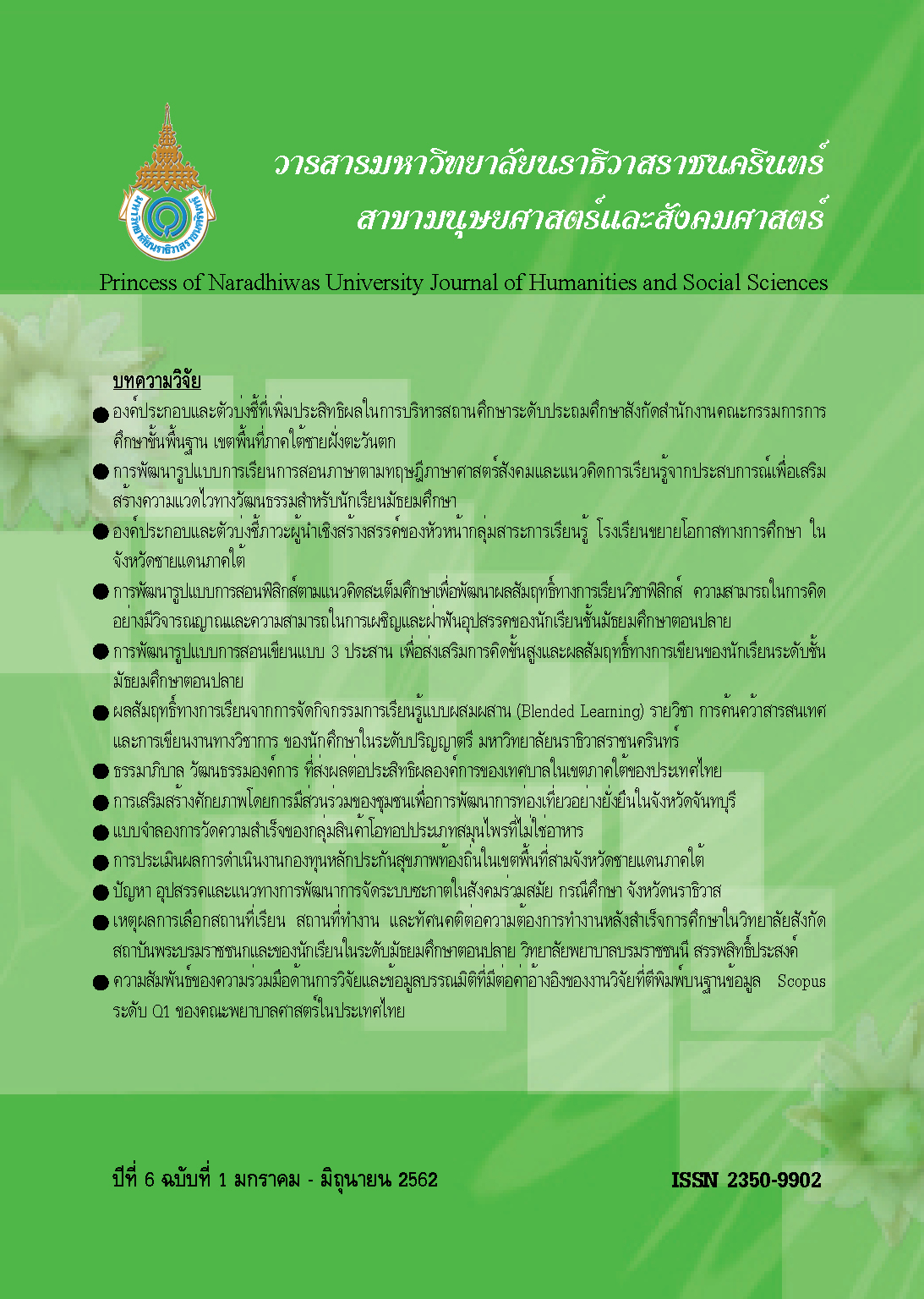ผลสัมฤทธิ์ของการจัดกิจกรรมการเรียนรู้แบบผสมผสาน (Blended Learning) รายวิชา การค้นคว้าสารสนเทศและการเขียนงานทางวิชาการ ของนักศึกษาในระดับปริญญาตรี มหาวิทยาลัยนราธิวาสราชนครินทร์
Main Article Content
บทคัดย่อ
การวิจัยครั้งนี้มีวัตถุประสงค์เพื่อ 1) ศึกษาผลการเรียนรู้จากการจัดกิจกรรมการเรียนรู้แบบผสมผสาน 2) เปรียบเทียบผลสัมฤทธิ์ทางการเรียนของการจัดกิจกรรมการเรียนรู้แบบผสมผสาน และ 3) ประเมินการจัดกิจกรรมการเรียนรู้แบบผสมผสาน รายวิชา การค้นคว้าสารสนเทศและการเขียนงานทางวิชาการ ของนักศึกษาระดับปริญญาตรี มหาวิทยาลัยนราธิวาสราชนครินทร์ กลุ่มตัวอย่าง คือ นักศึกษาระดับปริญญาตรีชั้นปีที่ 1 สาขาการบัญชี กลุ่ม 1 คณะวิทยาการจัดการ มหาวิทยาลัยนราธิวาสราชนครินทร์ ที่ลงทะเบียนเรียนในรายวิชาการค้นคว้าสารสนเทศและการเขียนงานทางวิชาการ ประจำภาคการศึกษาที่ 2 ปีการศึกษา 2560 เป็นจำนวน 48 คน เครื่องมือวิจัยที่ใช้ในการวิจัย คือ 1) แผนการสอนกิจกรรมการเรียนรู้แบบผสมผสาน 2) แบบประเมินผลการเรียนรู้ ได้ค่าความเชื่อมั่นด้วยสัมประสิทธิ์แอลฟาของครอนบาค เท่ากับ 0.78 3) แบบทดสอบการค้นคว้าสารสนเทศและการเขียนงานทางวิชาการ และ 4) แบบประเมินการจัดกิจกรรมการเรียนรู้แบบผสมผสาน โดยหาค่าความเชื่อมั่นของแบบทดสอบ โดยใช้สูตร KR–20 ได้เท่ากับ 0.86 วิเคราะห์ข้อมูลโดยใช้ค่าเฉลี่ย ค่าร้อยละ ค่าส่วนเบี่ยงเบนมาตรฐาน และค่าดัชนีประสิทธิผล
ผลการวิจัย พบว่า
- 1. ผลการเรียนรู้จากการจัดกิจกรรมการเรียนรู้แบบผสมผสาน พบว่า หลังการจัดกิจกรรมการเรียนรู้แบบผสมผสาน นักศึกษามีความกระตือรือร้นในการทำงานกลุ่ม การคิดวิเคราะห์ การฝึกปฏิบัติ การส่งงานที่ตรงเวลา และมีผลการเรียนรู้อยู่ในระดับมากที่สุดทุกการวัดและการประเมินผล
- 2. ผลสัมฤทธิ์ทางการเรียนของการจัดกิจกรรมการเรียนรู้แบบผสมผสาน หลังเรียนสูงกว่าก่อนเรียนโดยมีการพัฒนาขึ้นร้อยละ 52.98
- 3. การประเมินการจัดกิจกรรมการเรียนรู้แบบผสมผสาน พบว่า 3.1) ด้านผู้สอน นักศึกษาส่วนใหญ่คิดเห็นว่าอาจารย์สอนให้นักศึกษาเข้าใจได้ง่ายขึ้น 2) ด้านเนื้อหา นักศึกษาส่วนใหญ่คิดเห็นว่า เนื้อหาครอบคลุมและเหมาะสม สามารถนำไปปรับใช้ในชีวิตประจำวันได้ และ 3.3) ด้านวิธีการสอน นักศึกษาส่วนใหญ่คิดเห็นว่า อาจารย์มีเทคนิคในการสอนที่ดี
Article Details
เอกสารอ้างอิง
กิติพร โชประการ. (2555). ความคิดเห็นของนักศึกษาต่อ กระบวนการเรียนการสอน รายวิชาศิลปะการดำเนินชีวิต. วารสารศิลปศาสตร์ มหาวิทยาลัยอุบลราชธานี, 8(2), 145-165.
เดชดนัย จุ้ยชุม, ศิริกัญญา แก่นทอง และเกษรา บ่าวแช่มช้อย. (2559). การพัฒนาผลสัมฤทธิ์ทางการเรียน เรื่อง ทักษะการคิดของนักศึกษาในรายวิชาทักษะการคิด (Thinking Skills) รหัสวิชา 11-024-112 ภาคเรียนที่ 1 ปีการศึกษา 2558 ด้วยการเรียนรู้แบบมีส่วนร่วม (Active Learning). วารสารมหาวิทยาลัยนราธิวาสราชนครินทร์ สาขามนุษยศาสตร์และสังคมศาสตร์, 3(2), 47-57.
ชาญชัย ศรีไสยเพชร. (2527). ทักษะและเทคนิคการสอน (พิมพ์ครั้งที่ 2). กรุงเทพฯ: พิทักษอักษร.
ทิศนา แขมมณี. (2548). การจัดการเรียนรู้โดยใช้การวิจัยเป็นส่วนหนึ่งของกระบวนการเรียนรู้. กรุงเทพฯ: โรงพิมพ์แห่งจุฬาลงกรณ์มหาวิทยาลัย.
ธีระวงศ สายนาโก, ขวัญหญิง ศรีประเสริฐภาพ และวิไลลักษณ ลังกา. (2556). การพัฒนารูปแบบการเรียนการสอนผสมผสาน เพื่อฝึกปฏิบัติงานแอนิเมชั่นเบื้องต้นสำหรับนิสิตปริญญาตรี สาขาวิชาเทคโนโลยีสื่อสารการศึกษา. วารสารบัณฑิตศึกษา มหาวิทยาลัยราชภัฏวไลยอลงกรณ ในพระบรมราชูปถัมภ, 7(2), 16-30.
บัณฑิต ทิพากร. (2550). การพัฒนาคณาจารย์ในสถาบันอุดมศึกษา. ใน ไพฑูรย์ สินลารัตน์ (บรรณาธิการ). อาจารย์มืออาชีพ: แนวคิด เครื่องมือ และการพัฒนา. กรุงเทพฯ: โรงพิมพ์แห่งจุฬาลงกรณ์มหาวิทยาลัย.
บุญชม ศรีสะอาด. (2535). การวิจัยเบื้องต้น. (พิมพ์ครั้งที่ 2). กรุงเทพฯ : โอเดียนสโตร์.
ไพฑูรย์ สินลารัตน์. (2545). การเรียนการสอนที่มีการวิจัยเป็นฐาน. กรุงเทพฯ: โรงพิมพ์แห่งจุฬาลงกรณ์มหาวิทยาลัย.
ยืน ภู่สุวรรณ. (2551). การประยุกต์ใช้เทคโนโลยีอินเทอร์เน็ตและเทคโนโลยีมัลติมีเดียเพื่อการศึกษาและประเด็นการวิจัย. ขอนแก่น: มหาวิทยาลัยขอนแก่น.
เลอสันต์ ฤทธิขันธ์, ทรงศักดิ์ สองสนิท และประวิทย์ สิมมาทัน. (2561). การพัฒนารูปแบบการเรียนรู้แบบผสมผสานร่วมกับทฤษฎีการขยายความคิดเพื่อส่งเสริมการถ่ายโยงการเรียนรู้ และทักษะการแก้ปัญหา สำหรับนักศึกษาระดับประกาศนียบัตรวิชาชีพ. วารสารการวัดผลการศึกษา มหาวิทยาลัยมหาสารคาม, 24(1), 269-284.
สัมฤทธิ์ เสนกาศ, กันต์พงษ์ วรรัตน์ปัญญา และสรเดช ครุฑจ้อน. (2554). การพัฒนาตัวแบบการเรียนรู้แบบผสมผสานเนื้อหาและกิจกรรมการเรียนด้านการเขียนโปรแกรมคอมพิวเตอร์. วารสารบรรณศาสตร์ มศว, 4(2), 80-94.
Bersin, J. (2004). The blended learning book: best practices, proven methodologies and lessons learned. San Francisco, CA: Pfeiffer Publishing.


